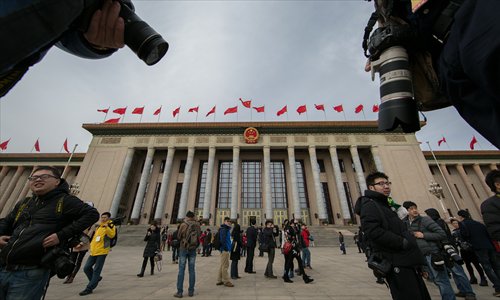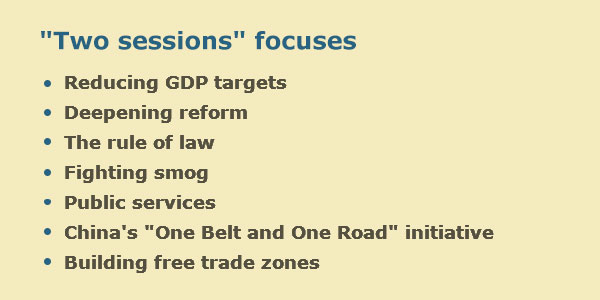HOME >> CHINA
Two sessions preview: China at the crossroads of another wave of reforms
Source:Global Times Published: 2015-2-24 20:13:01

Photographers working outside the Great Hall of the People during the "two sessions" on March 8 2014 Photo: IC
As the early March annual sessions of the NPC and the CPPCC approach, observers say China is at the crossroads of another wave of reforms, a response to changing problems.
Sweeping reform
Reform has been a catchphrase of the political life of China since the late 1970s, which, along with the opening up policy, created decades of unprecedented economic and social development. This year is seen as a crucial year for comprehensively deepening reform in the political, social and economic spheres and preparing a roadmap of reforms for the years to come.
The upcoming "two sessions" is expected to highlight further reform policies in both Premier Li Keqiang's government report and proposals put forth by deputies.
A wide range of issues, such as administrative reform, and shifting the role of government from control to service, are expected to be discussed during the meetings and on the sidelines of the two sessions, with policy changes aiming to involve grass-roots organizations and the people in the reforms.
Under the current government, previous years have seen innovative reforms such as the establishment of the Shanghai free trade zone, and the abolishment of hundreds of government approvals previously required for civil and economic activities. The rule of law, highlighted during a 2014 Party congress, will be further elaborated and implemented this year as a principle of governance.
Faced with increasing demand for social reforms, policymakers are engaging with the task of expanding social equality to create fairer access to education, medical care, pension and other social welfare for the general public. How to gradually loosen the household registration control, or the hukou system, and provide equal opportunities to non-local residents in the face of urbanization and population flow, is an area that will affect hundreds of millions of people.
With China's economy headed towards a soft landing, the sweeping reforms are also designed to bolster the economic "new normal," sacrifice the pursuit of specific growth figures to move towards a more technologically advanced economy that can better protect the environment.
Anti-graft
China's anti-graft campaign kicked off to a high-profile start in December 2012 following the announcement of a probe into Li Chuncheng, former deputy Party chief of Sichuan Province. During the past two years the sweeping campaign has reshaped the country's political and social dynamics, while penetrating into ordinary people's lives.
As of February, over 70 officials of provincial or above levels have been investigated or prosecuted, crowned by the investigation of former security chief Zhou Yongkang. According to public reports, the number makes up nearly one-third of all investigated senior officials since the republic was founded in 1949."No exceptions" is a crucial factor of the anti-graft campaign, demonstrated by the large number of toppled officials and unprecedentedly senior targets. The leadership has further showed its determination by extending the campaign into almost all vital sectors, including the military, energy, finance, State-owned assets, as well as media and sports.
Beginning with individual cases, disciplinary watchdogs have gradually woven a net by mapping out heavily corrupt regions and cohorts, including the power networks of Zhou, and cliques in regions such as Shanxi and Sichuan provinces. Cracking down on these groups has become an effective remedy to the damage to justice and order caused by such chains of interests, which rely heavily on nepotism and under-the-table dealings.
As a key practice of rule of law, it is anticipated that specific anti-graft legislation will be discussed at the upcoming "two sessions." After establishing a new anti-graft bureau last year, China's Supreme People's Procuratorate stated on February 21 that it will push for the legislation, signaling that the endeavor will be expedited.
Observers have said that the anti-graft law should focus on setting clear rules to define boundaries of public power. It should also integrate the fragmented legal framework governing Party discipline, the Criminal Law and other related laws to punishing the corrupt, pushing what is currently a case-by-case way of investigating onto a more systematic legal track. Analysts have also suggested that transparency in the investigation and trial processes should also be improved to secure the rights of the probed officials and the public's right to know.
Economic predictions
At the start of the "two sessions," Premier Li Keqiang will deliver a government work report highlighting a slew of key economic targets for the year.
Among the most closely watched are the yearly GDP growth target, which is widely forecast to be lower than last year's 7.5 percent, mirroring the "new normal" of slower but higher quality growth.
In January, it was reported that China's economy expanded at 7.4 percent in 2014, the slowest expansion in 24 years and missing the official target for the first time since 1998. Forecasts for this year's growth target vary among economists and experts, but a commonly held view is that it might remain soft well into 2015. The World Bank said in late October while releasing its thrice-yearly review of the Chinese economy that growth target could be cut to 7 percent this year, part of a set of reform plans devised to rebalance the economy.
Saying that reforms are set to better serve the economy, Jing Ulrich, managing director and vice chairman of Asia Pacific at investment bank JPMorgan Chase & Co noted in late January that the Chinese economy is expected to maintain steady growth for the year. She predicted that the economy will grow at 7.2 percent in 2015, buttressed by a set of reform efforts ranging from finance to taxation, to the State-owned sector pushed by the government.
There is also a more pessimistic outlook for the growth landscape, with Beijing-based research group Unirule Institute of Economics, a private think tank, releasing a research report in late January saying that growth may bottom out at around 6.8 percent for 2015, citing downside risks to investment.
The downward pressure on the economy from the cooling property market was also mentioned by UBS economists Wang Tao and Zhang Ning in a research note e-mailed to the Global Times earlier in February.
The economists estimate that infrastructure investment may further decline in the first quarter of 2015, which, coupled with a slowdown in property construction, is likely to result in reduced momentum for the already-cooling economy. Nonetheless, policy uncertainties could be allayed after the conclusion of the annual two sessions, helping to drive a rebound in GDP growth in the next two quarters, they remarked.
'One Belt and One Road'
In 2013 during his visits to Central Asia and Southeast Asia, Chinese President Xi Jinping laid out a vision for "One Belt and One Road," referring to initiatives to build a Silk Road economic belt and a 21st century maritime Silk Road.
The "One Belt and One Road" represents for China and the outside world a prime opportunity to build cooperation. The Belt will link China with Europe through Central and Western Asia while the Road will connect China with Southeast Asian countries, Africa and Europe. "It serves more as a roadmap for Chinese investments to go global and for China to forge a global partnership network." Zhao Minghao, a research fellow at the Charhar Institute, a Chinese foreign-policy think tank, told the Global Times.
The "One Belt and One Road" signals a recalibration of both China's internal and external policies. It aims to propel an open economic system within the country while further integrating China into the world economy and deepening cooperation with the outside world, especially in terms of building infrastructure and other development projects.
Xi announced the creation of a $40 billion Silk Road Fund to support the development of the "One Belt and One Road" on November 8 at a dialogue meeting on strengthening connectivity and improving cooperation in the country's neighborhood. The fund is designed to improve trade and transport links in Asia and was established on December 29. According to a statement by the People's Bank of China on Monday, the Fund is now active, and will "seek investment opportunities and provide monetary services throughout the Belt and Road Initiatives."
Since Xi proposed the "One Belt and One Road" initiative, how to best push forward the initiative has aroused heated discussions at home and abroad. The initiative is expected to be one of the focal points in the "two sessions."
"After over two years of planning, collecting and analyzing public reactions and refinement, first-phase preparations have been finished. How the blueprint will be implemented is anticipated to be laid out in this year's government work report, which will be delivered during the two sessions." Zhao said.
Global Times

Backgrounder
The third annual session of the 12th National People's Congress (NPC), the country's top legislature, will open on March 5. The third session of the 12th National Committee of the Chinese People's Political Consultative Conference (CPPCC) will open on March 3. Both meetings will be held in Beijing.
National People's Congress (NPC)
The NPC is the country's top legislature, which generally meets once a year. NPC motions become legally binding when they are adopted. The NPC exercises legislative power, amends the Constitution and supervises its enforcement, formulates and amends basic statutes and other laws; elects and decides on the leading personnel of State-level administrative, judicial, procuratorial and military bodies, and has the right to recall them; supervises government work in accordance with the Constitution and laws; and examines and decides on the fundamental, long-term and key issues of the State. Deputies to the NPC are members of the highest organ of State, which also have the right to recall any deputies they have elected. The NPC Standing Committee, the permanent organ of the NPC, is elected by the NPC and exercises the legislative power of the State together with the NPC.
Chinese People's Political Consultative Conference (CPPCC)
The CPPCC, China's top political advisory body, consists of representatives of the CPC and non-Communist parties, personages without party affiliation, and representatives of people's organizations, ethnic minorities and various social strata. The annual session of CPPCC National Committee is the nation's highest arena for political consultation. The CPPCC is held every year in March, concurrent with the NPC annual meeting. The two major political meetings are called the "two sessions" in China.
What to expect
One of the highlights of the "two sessions" is typically the premier's report on the government's work. Premier Li Keqiang will also hold a press conference. Owing to China's ongoing anti-graft efforts, reports from the Supreme People's Court and the Supreme People's Procuratorate will be worthy of attention as well. NPC and CPPCC's reports will review the two bodies' work during 2014, with press conferences for the two hotly anticipated.
Focuses
This year both local and national "two sessions" will focus on reducing GDP targets, deepening reform, the rule of law, fighting smog, public services, China's "One Belt and One Road" initiative, and building free trade zones.
Newspaper headline: Roadmap to change
Posted in: In-Depth